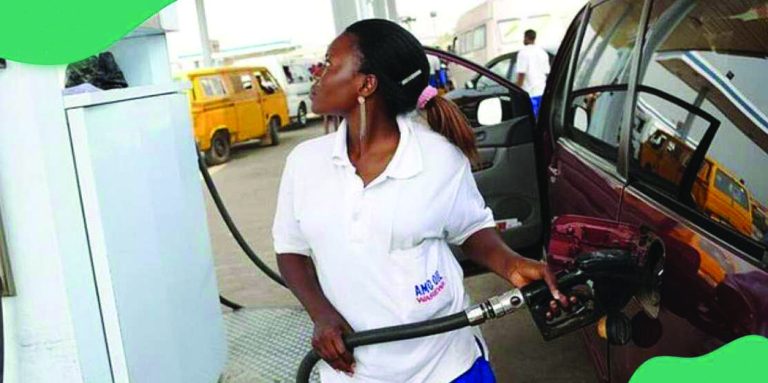The ongoing petrol price war between the Nigerian National Petroleum Company Limited and Dangote Refinery, understandably for control of market share, is having a positive impact on Nigerians and the country’s downstream oil and gas industry. However, while this development is good for the market, relevant industry regulators must be on alert and watch out for the possible emergence of a cartel of few players to fix prices against the standard market practice, Peter Uzoho writes
It has been an interesting time for the downstream sector of the Nigerian oil and gas industry since the eventual removal of petrol subsidy by the current administration in a bid to entrench a deregulated regime controlled by market forces with thriving competition.
In operationalising the new regime, the Nigerian National Petroleum Company Limited (NNPC) – since the resumption of refining operations at the Port Harcourt and Warri refineries, and Dangote Refinery, have since engaged in stiff competition in a fight for control or retention of market share, particularly in petrol. Both have been adjusting their petrol prices lower, often in response to the other’s earlier action and Nigerians have become the ultimate beneficiaries considering the impact of petrol prices on commodity and transport costs in the country.

Last Monday, NNPC, albeit with no official communication, adjusted its petrol price down to N860 and N865 per litre in Lagos and Abuja, respectively, from the previous N945. This came a few days after the Dangote Refinery had reduced its ex-depot petrol price from N890 to N825 per litre, making it the second price reduction in the new year, and the third one in a space of two months.
In a public notice on the price slash, Dangote announced that the retail prices at filling stations owned by its three official off-takers -MRS, Ardova (AP), and Heyden will be N860, N865, and N865 per litre, respectively.
The price reduction has led to motorists and other consumers swarming NNPC”s filling stations and those of MRS, AP, and Heyden selling Dangote products, in search of cheaper fuel as other marketers sell higher with less patronage.
Nigerians, Downstream Sector as Ultimate Winners
In what has now been described as a price war between the NNPC and Dangote Refinery, many analysts and industry experts have said the lowering of prices in quick succession was anticipated as a key attribute of a free market where the consumers and the downstream sector become the ultimate beneficiaries. For Nigerians, apart from having cheaper petrol, which will reduce their energy cost amid the spiralling inflation in the country, they also now have freedom of choice amid many marketers of the products.
The downstream oil and gas industry is also benefiting from the price war as it has helped to eliminate the emergence of a monopoly in the sector. In the past, NNPC was the sole importer and supplier of petrol in Nigeria while the government determined prices against the standard market practice, with a huge burden on the nation’s economy, and lots of associated corruption and inefficiencies.
Weighing in on the ongoing price war, the Petroleum Retailers Outlet Owners Association of Nigeria (PETROAN) said the recent petrol price reduction by the Dangote refinery and NNPC filling stations will help tame inflation.
According to the National President of PETROAN, Dr Billy Grillis-Harry, the reduction of price by NNPC was expected to alleviate the financial burden on Nigerians amid rising inflation.
“This price reduction will be a huge relief to many Nigerians struggling to make ends meet,” Gillis-Harry stated.
He maintained that the reduction in petrol price was expected to positively impact Nigerians in terms of decreased transportation costs, making it easier for people to commute and transport goods.
“Lower transportation costs will lead to reduced food prices, making it easier for Nigerians to access affordable food,” he added.
He also applauded Dangote refinery for agreeing to refund N65 to retail outlet owners affected by the price reduction.
The refund initiative follows Dangote Refinery’s recent reduction of its gantry price from N890 per litre to N825 per litre. The refinery had said customers who purchased petrol at higher rates than the advertised prices from its key partners were eligible for a refund.
“The refund amount is N65 per litre on over 200,000 metric tonnes of PMS purchased by marketers at the old gantry price. Dangote has absorbed a N16 billion loss to implement these refunds, demonstrating its commitment to fair pricing and consumer welfare.
“The refund initiative will also positively impact retail outlet owners, who will benefit from reduced prices and refunds. Many retail outlet owners purchased PMS at a higher rate before the price reduction, and the refund will help mitigate their losses.
“We commend Dangote Refinery for this initiative, which will help reduce the financial burden on our members,” Gillis-Harry added.
Sharing his thoughts on the development, a former Chairman of the Major Energies Marketers Association of Nigeria (MEMAN), Mr. Tunji Oyebanji, told THISDAY, Exclusively, that the ongoing competition and lowering of prices was not surprising as it was foretold that deregulation was the best regime for the downstream sector.
“Well, it’s nothing surprising to me because I’ve always told you that once the market is deregulated, there will be competition and it will force the prices down. I’ve been saying this for years in trying to justify why there should be deregulation,” Oyebanji said.
Regulators Must Watch out for Price Fixing, Others
But beyond the benefits of the ongoing price war between NNPC and Dangote, Oyebanji raised concerns about the danger of pricing some marketers out of business due to their inability to survive because the basis of the price cuts was not yet known.
This, he explained, may lead to the emergence of a few players forming a cartel to fix prices against market standards, and that over time, prices may go beyond the reach of the consumers because only a few players exist.
He called on the regulators of the industry which include the Nigerian Midstream and Downstream Petroleum Regulatory Authority (NMDPRA) and the Federal Competition and Consumer Protection Commission (FCCPC) to look beyond the ongoing price war and watch out for an attempt by any few players to collude in fixing prices.
Oyebanji further said, “Some people may even be selling below their cost to drive other people out of the markets. So, the only challenge is that usually, typically, where this happens, when people have now been driven out of the market and there are now only a few players in the industry, then the opposite starts happening because it’s a stuck position.
“The opposite is that when there are only a few players left, some people have been driven out of the market. So, you may now find what is happening in the cement sector happening in the downstream sector. Like the cement, there are only three players now, there’s Lafarge, there’s Dangote, and BUA Cement. They then determine the price. So, you may find that the opposite happens and prices are not as low as they should be.
“Another thing is that we are going to make sure the price doesn’t go as low as this. So, the regulators need to be sure that people are not colluding on the price.
“But what the government should not allow is to be cooperating on price. That price war is bad because it may look good when the price is going down. But people can also combine and hold prices. Maybe the price, if there was competition, should be lower than it is.
But because of all the players, they are now few. They now agree together and say, don’t let us allow it to go below N900. So, regulators need to be on top of this area.”
Analysts Back Price War
In his intervention, the Managing Director of Financial Derivatives Company (FDC), Mr. Bismarck Rewane, said Nigerians will benefit more from the seeming petrol price war between Dangote refinery and NNPC as fuel prices were expected to decline till June 2025, giving room for more economic stability.
Rewane stated that the downward trend in petrol prices means “we might begin to see some stabilisation” depending on what happens in the global oil and currency market.”
“This will offer a breather for Nigerians who are paying over triple to buy the same litres of fuel two years after the removal of fuel subsidies that have kept prices artificially low.
“In a price war, nobody wins; the consumers win in the short run, and then eventually, the market goes back to where it should be. But, at the end of the day, between now and June, the price leadership will be firmly established,” Rewane said.
The economist also explained that Dangote Refinery’s reduction in the pump price of petrol was due to production cost efficiency, among other factors.
On his part, financial analyst and Chief Economist at SPM Professionals, Mr. Paul Alaje, said that the price of petrol may drop to between N650 and N800 per litre if the price war or competition between Dangote Refinery and NNPC continues.
Alaje warned of risks if the price war between the two big players fails to continue.
Stay ahead with the latest updates!
Join The Podium Media on WhatsApp for real-time news alerts, breaking stories, and exclusive content delivered straight to your phone. Don’t miss a headline — subscribe now!
Chat with Us on WhatsApp








